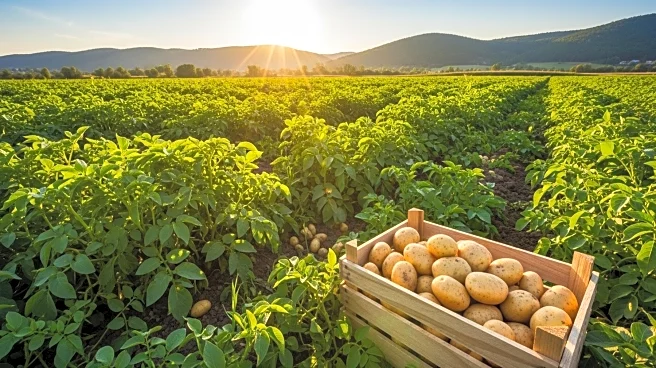What is the story about?
What's Happening?
Lay's has announced a significant change to its potato chips, marking the largest global refresh in the brand's history. By the end of 2025, Lay's plans to remove artificial colors and flavors from its products, opting instead for natural ingredients sourced from spices, fruits, vegetables, and other natural materials. This change is part of a broader industry shift following the FDA's decision to revoke authorization for synthetic food dyes, including FD&C Red No. 3. Lay's will also reformulate some of its chips to reduce fat content, using olive oil and avocado oil in place of corn and vegetable oils. The brand is also updating its visual identity, including a new logo and packaging that emphasizes the use of real potatoes.
Why It's Important?
This move by Lay's reflects a growing trend in the food industry towards cleaner, more natural products. As consumers become increasingly health-conscious, companies are responding by eliminating artificial additives and focusing on transparency in their ingredient lists. Lay's decision could influence other brands to follow suit, potentially leading to widespread changes in the snack food sector. The shift to natural ingredients may also impact supply chains, as companies seek reliable sources for these materials. Additionally, the visual refresh aims to enhance brand appeal and consumer awareness, potentially boosting sales and market share.
What's Next?
Lay's will implement these changes across all its potato chip products by the end of 2025. The company will monitor consumer reactions to the new formulations and packaging, which could influence future product development and marketing strategies. Other brands within the Frito-Lay portfolio, such as Tostitos and SunChips, are also expected to undergo similar transformations. The FDA's Industry Tracker will continue to monitor compliance with the new standards, potentially prompting further industry-wide adjustments.
Beyond the Headlines
The shift towards natural ingredients raises questions about the long-term sustainability of sourcing these materials. As demand increases, companies may face challenges in maintaining consistent quality and supply. Additionally, the move away from synthetic additives could lead to innovations in food science, as brands explore new ways to enhance flavor and appearance naturally. This transition also reflects broader cultural shifts towards health and wellness, influencing consumer behavior and expectations.
















